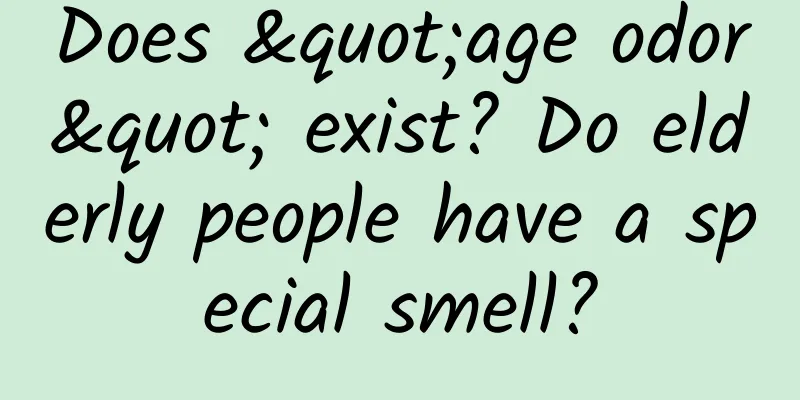Does "age odor" exist? Do elderly people have a special smell?

|
Leviathan Press: Many people have probably smelled a "senile smell" in places where the elderly live: the unventilated air is mixed with a smell of grease and mold. Some people think that this is related to the fact that the elderly take fewer baths due to their mobility problems, while others think that it is caused by not washing bedding and pillowcases for a long time. But no matter what, it is still difficult to describe that smell as beautiful. However, today's article provides a different perspective on the "smell of old age" and may change your previous impression. Last year during an extended trip, my husband and I loaned our home in the Ozark Mountains to an elderly couple who were renovating their home. When we returned a month later, the house was spotless and had two presents from the couple, but there was also a distinct smell in the air: stale and slightly sweet, like the slightly musty smell you get when you first open a box of paper. I wiped the countertops and mopped the floors, but the smell remained. It wasn't particularly bad, but it was strange and a little unpleasant. Late at night, I guiltily searched the Internet: "Do old people have odor?" "The answer I found is yes, no, and maybe... I sent my question to a group of female writers, ranging in age from 40 to 70, and got very different answers. The younger women said yes, there are odors associated with aging. But to the older women, it sounded ageist, and some were offended. At 52, I was a bit sensitive about this, but I also needed to get real information. If there was anything I could do to improve my personal scent now and in the future, I wanted to know. So I consulted two scientists at a well-known research lab and encountered the exact same disagreement. Johan Lundstrom, a 46-year-old biologist at the Monell Chemical Research Center, says his research confirms what Japanese researchers found in 2001[1]: an unsaturated aldehyde called 2-nonenal is more concentrated on the skin of older people, often producing a distinctive orris root, waxy or oily odor. His study—albeit smaller—used armpit samples from people ranging in age from 20 to 95 and presented them to 41 participants, who were asked to rank the intensity and unpleasantness of the odors.[2] Additionally, Dr. Lundstrom and his co-authors found that “participants were able to correctly classify body odors from older donors as old, but were unable to classify body odors from other age groups as old. However, George Preti, 74, an organic analytical chemist also at Monell, said his results did not match those of the Japanese group or Dr. Lundstrom’s team.[3] Dr. Preti’s team used samples from the upper back and forearm and subjected them to gas chromatography and mass spectrometry, concluding that “no analytical method” showed the presence of 2-nonenal in the elderly subjects. “Older people actually smell less than younger people,” Dr. Pretty said. “Unless you go to a nursing home, where there may be hygiene issues, you’re unlikely to smell this musty, unpleasant odor that everyone talks about.” "I know what George told you, but he's wrong. His research scope is too narrow. He's just more sensitive to the topic because he's older," Dr. Lundstrom said in a half-joking tone. Studies generally show that in double-blind “smell tests”, middle-aged men are considered to have the worst odor, being more objectionable than samples from younger and older people (despite our concerns, middle-aged women have the best odor). Chemical analysis also confirms this, as sebum secretion levels are lower in very young and older people [4]. Dr. Lundstrom's study confirmed the existence of "old age smell," but he also noted that participants generally found it "neutral" and "not offensive." He believes the main reason why smells are perceived as negative is because of the environment. Dr. Lundstrom said it's a bit like the smell of fresh manure: when you smell it in a stable, it's seen as a natural smell. But smelling it in a bedroom can be disturbing and unpleasant. “In the Japanese study, when the researchers didn’t tell the participants where the smell came from, they rated it as ‘harmless,’ ” Dr. Lundstrom said, “but when they said it came from an elderly person, it was rated as ‘annoying.’ ” © コニカミノルタ In Japan, this bias is evident. They have given the smell of old people a name — kareishu — with clear negative associations. A Japanese company called Mirai Clinical sells a $16 persimmon-extract soap that promises to eliminate this “unpleasant” odor. Dr. Pretty was unconvinced by the 2001 findings. "I was 57 when the Japanese study came out, and I remember feeling quite hurt," he said. "They included people in their 40s in the 'older' group they sampled. That was ridiculous. Dr. Lundstrom, while agreeing with the Japanese findings, is wary of the industry surrounding age odor; he says expensive creams and soaps are not the answer. "Smell is very much subconscious," Dr. Lundstrom said, "so there's no use masking it. Each scent binds to specific chemical receptors in the nose, and even in strong perfumes, those messages are transmitted." So he advises his aging parents to stay active, air out their homes and wash their bedding and clothing regularly, even if they don't look dirty. Other factors are harder to control, like genetics and overall health. Dr. Pretty, despite being a firm believer that older people smell less and better than younger people, offers many of the same suggestions. © Discover Magazine Scientists agree that people with chronic illnesses are more likely to have odor, regardless of age. Dr. Pretty attributes this to diet, metabolism and self-care, while Dr. Lundstrom thinks it may be related to ongoing inflammation leading to cellular decay, a possibility he is investigating. “Yes, that actually makes some sense,” Dr. Pretty said amiably when hearing Dr. Lundstrom’s theory. “We didn’t discuss inflammatory disease, and all the subjects in my study reported being in good health.” Both researchers note that people's sense of smell tends to weaken as they age, so self-monitoring — such as breathing into your hand over your mouth or sniffing your armpits — usually stops working around age 70. © IFLScience “I believe that a healthy 80-year-old will smell less than a healthy 30-year-old,” Dr. Pretty continued, “but once disease is introduced, it becomes complicated. Believe me, I’ve taken care of people who’ve had multiple strokes, and that’s a whole different ball game.” 2-Nonenal and its close relative, nonanal, are aldehyde compounds that were discovered in the 1920s and have been widely used in the perfume and food industries since then. “In the perfume industry, you can also find nonanal on older skin, where it’s known as C-9 aldehyde and is a wonder ingredient in Chanel No. 5,” says Craig Warren, a perfume consultant and former vice president and research director of fragrance science at International Flavors & Fragrances. © Senior Planet “You might find more of these aldehydes in the Japanese than in the Americans,” he said. “But I’m almost 80 years old and I’ve studied smell all my life. If someone told me I had a particular odor, I wouldn’t get mad. I’d want to do something about it.” (Dr. Pretty also noted that the Japanese subjects may have had higher levels of nonanal because they often ate fish.) A new odor-masking approach may offer a solution. Warren has teamed up with an Illinois company called Belle Aire Creations, which has developed a technology that combines chemical masking products with substances with unique odors to form larger molecules that are nonvolatile—meaning they no longer evaporate from surfaces into the air. “Nonanal would be a perfect candidate for this masking technology,” Warren said. “But as far as I know, no one has asked for a product to eliminate this odor. The market doesn’t have that need.” Dr. Warren said the topic might be too sensitive for American companies. Makers of feminine hygiene sprays have received complaints of sex discrimination, so health and beauty companies might be wary of angering older consumers. For now, the best advice for combating age-related odor is to take care of yourself and your home: exercise, stay healthy and hydrated, eat clean foods, open windows for ventilation, and wash clothes and sheets. And don't worry too much about this. I recently visited an elderly couple who were staying at my place to return some things they had forgotten to bring. They made tea, and as we chatted, I caught the same old, slightly sweet, musty smell. But I didn't feel out of place in their cozy, pillow-filled living room. Environment. In this respect, I think Dr. Lundstrom is right. References: [1]pubmed.ncbi.nlm.nih.gov/11286617/[2]pubmed.ncbi.nlm.nih.gov/22666457/[3]www.ncbi.nlm.nih.go v/pmc/articles/PMC2574753/[4]journals.plos.org/plosone/article?id=10.1371/journal.pone.0038110 By Ann Bauer Translated by tim Proofreading/tamiya2 Original article/www.nytimes.com/2019/08/08/well/live/do-older-people-have-a-different-smell.html This article is based on the Creative Commons License (BY-NC) and is published by tim on Leviathan The article only reflects the author's views and does not necessarily represent the position of Leviathan |
<<: The complex three-body problem has tens of thousands of solutions?
>>: From an i-person to an e-person, see Oppenheimer's legendary life
Recommend
Kuaishou Information Stream Advertising Guide
Short videos have become the main carrier of info...
Is there any difference between Douyin Feed and Dou+?
"Should the live broadcast room be put into ...
OPPO Enco W51 TWS earphones review: good quality, low price and noise reduction, AirPods pale in comparison
Nowadays, whenever we talk about Bluetooth headse...
The hot clouds dispersed, and the cool breeze rose
Loading long image... Source: National Geographic...
How to create a hot-selling fission event promotion?
Fission is an important part of studying user gro...
By the way, why did BlackBerry choose Indonesia as its last market?
Last month, BlackBerry announced that it would no...
Competitive product analysis report: Douyu VS Huya
Live streaming is a carnival for a group of lonel...
The flames emitted by rockets are over 3000℃, how come they don't burn themselves? They have ways to cool down
Relying on the high-temperature flame ejected fro...
Mobike has difficulty returning deposits, raised 3 billion in financing but still owes users money?
Mobike's deposit issue has always been a sour...
China's first special anti-COVID-19 drug takes effect immediately after infusion! An article reviews this "war without gunpowder"
Recently, my country's first special drug aga...
Can eating the right snacks help you live longer? Foodies finally have a reason
Key Points ★ Treat snacks rationally: choosing th...
WeChat group money-making project, one order earns hundreds to thousands, monthly income exceeds 100,000+
Qingmu WeChat group money-making project, one ord...
8 Tips for B2B Digital Marketing
In a recent white paper, Accenture released an in...
Why do some animals have round faces? Why does an owl have a "cat head"?
In this world, some animals are loved and paid at...
Aite Tribe Stories (17): My Two Days and Two Nights of Fighting with Eternal Blue
[Original article from 51CTO.com] redhat9i is a n...









